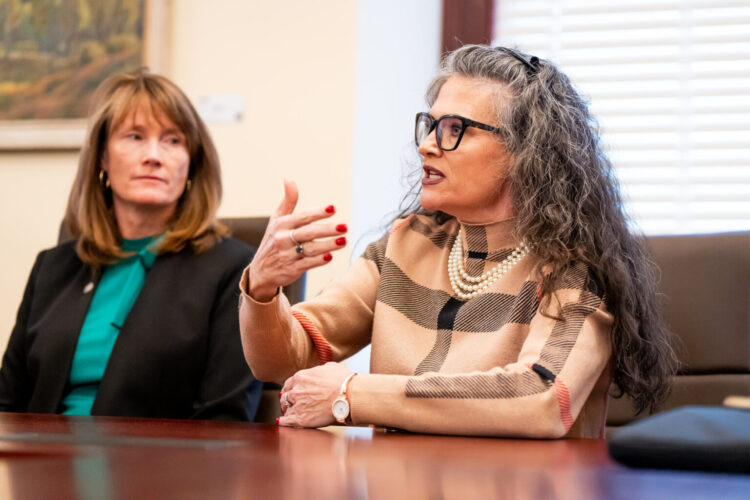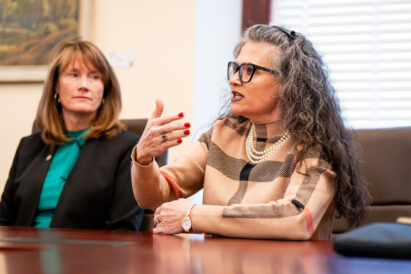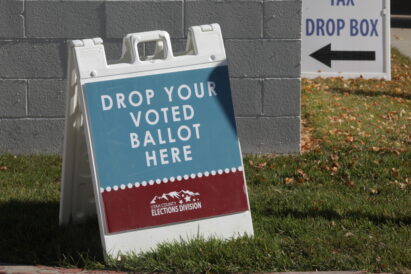Democrats warn Utahns could pay thousands more for health coverage if ACA subsidies end
An independent Utah filmmaker says an end to the tax credits ‘really impacts me and my business’

Photo by Spenser Heaps for Utah News Dispatch
Senate Minority Assistant Whip Jen Plumb, D-Salt Lake City, is pictured on the first day of the legislative session at the Capitol in Salt Lake City on Tuesday, Jan. 16, 2024.More than 1 in 10 Utahns relies on the Affordable Care Act marketplace for health coverage. For many of them, the cost will go up next year if Congress doesn’t extend particular tax credits.
On Wednesday, a Democrat in the Utah Legislature and two in Congress urged Republicans in Washington, D.C. to agree to keep the subsidies going so Utahns don’t get priced out. The enhanced tax credits are at the center of the federal government shutdown, the longest in the nation’s history.
Minnesota Democratic Sen. Amy Klobuchar said in a virtual news conference that more than 421,000 Utahns get their health insurance through the marketplace.
If the subsidies end, a 60-year-old Utah couple earning about $83,000 will see their premiums increase by more than $19,000 per year, Klobuchar said. For a family of four bringing in $64,000, she said the cost would triple, going up by more than $2,500.
“That’s a real gut punch,” Klobuchar said, reiterating points she’s made recently in North Carolina and Iowa.
With the end date approaching, Salt Lake City filmmaker Stan Clawson said he’s worried.
“I’m really looking to the future, as many other people are, and wondering, will I be able to afford a doubling of my premiums?” Clawson said during the news conference.
Clawson fell 49 feet while rock climbing almost 30 years ago, injuring his spinal cord and paralyzing him below the mid-torso, he said. He uses a wheelchair and catheters, and his insurance helps keep the costs of medical equipment low.
Still, he’s spent about $12,000 out of pocket on medical expenses this year, he said, on an income of about $42,000.
“This tax credit going away really impacts me and my business,” Clawson said.
State Sen. Jen Plumb, D-Salt Lake City, said Utah’s hospitals and emergency rooms will take on a bigger burden if thousands drop their insurance because it’s too expensive.
Plumb, an emergency room pediatrician, said she already sees patients on a routine basis who can’t afford coverage and wait until they’re in crisis to seek medical attention.
“This isn’t like an abstract policy concept,” Plumb said. “It’s what we see on the faces of patients every shift.”
Sen. Ron. Wyden, an Oregon Democrat, foresees ripple effects. Even those insured through their jobs, not the Affordable Care Act, could see their rates go up due to cost shifting, Wyden said.
Some Republicans, including Utah Sen. John Curtis, have said the enhanced credits were meant to be a short-term solution during the COVID-19 pandemic and keeping them in place could add to rising health care costs.
“A lot of Republicans are very sympathetic to increasing premiums. We’d love to have a discussion about that,” Curtis told reporters last month. But he does not believe the current enhanced subsidies should continue for those at four times the poverty level, he said – $63,600 for an individual; $128,600 for a household of four.
Utah Republican Rep. Mike Kennedy, a physician, told reporters on Monday that he wants to see the premium increases discussed in Congress, but blamed Senate Democrats for not opening the government first.
“To me, this is an essential issue for us to work through, and I’m committed to understanding how important these premium increases are to people,” Kennedy said. “Not to negate the issue, but as we debate and discuss that issue, if you would like to tell me why five Democrats aren’t willing to open up the Senate side of the government, and then we can have these discussions.”
Klobuchar said the COVID-19 pandemic did drive up medical costs, and “our job is to make this affordable, and it’s not affordable when the premiums double.”
With a monthly average tax credit of $463, the monthly average marketplace plan premium for Utah residents is $70, according to a report from the University of Utah’s Kem C. Gardner Policy Institute.
Utah News Dispatch is part of States Newsroom, the nation’s largest state-focused nonprofit news organization.



